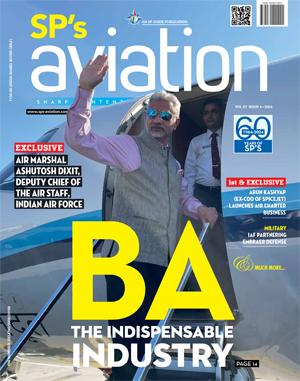INDIAN ARMED FORCES CHIEFS ON
OUR RELENTLESS AND FOCUSED PUBLISHING EFFORTS

SP Guide Publications puts forth a well compiled articulation of issues, pursuits and accomplishments of the Indian Army, over the years

I am confident that SP Guide Publications would continue to inform, inspire and influence.

My compliments to SP Guide Publications for informative and credible reportage on contemporary aerospace issues over the past six decades.
No helicopters for VVIPs

NEWS
End of March 2013, the Indian Air Force (IAF) informed the Defence Ministry that after February 2014 there will not be a single helicopter in its elite squadron which would be fit to carry VVIPs. The currently available Russian-made MI-8s will complete even their extended lives by February 2014 and would not have any replacement, as the investigation into the VVIP helicopter scam has cast a shadow over acquisition of the AgustaWestland AW101 helicopters. This assessment has left the Ministry speechless and at the same time attempted to nudge the Ministry to shed the slow pace of investigation into the AgustaWestland VVIP helicopter probe. Confirming the development, a senior IAF officer said, “We are supposed to keep the Ministry apprised at all times and that is exactly what we did.”
VIEWS
The IAF can hardly be blamed for the sordid state of affairs as way back in 1999 it had projected the requirement of new helicopters to replace the ageing fleet of Mi-8 helicopters inducted in the early 1970s and are currently in use for VVIP travel. These helicopters no longer provide the level of safety and comfort that the IAF is expected to offer for VVIP travel. The IAF is in the process of inducting the more modern Mi-17V5 helicopters of Russian origin to meet its operational demands, but converting these for VVIP use would impinge on the more pressing commitments of the rotary-wing fleet, growing by the day with increasing involvement of the IAF in anti-Naxal operations.
The IAF can hardly be blamed for the sordid state of affairs as way back in 1999 it had projected the requirement of new helicopters to replace the ageing fleet of Mi-8 helicopters inducted in the early 1970s and are currently in use for VVIP travel. These helicopters no longer provide the level of safety and comfort that the IAF is expected to offer for VVIP travel. The IAF is in the process of inducting the more modern Mi-17V5 helicopters of Russian origin to meet its operational demands, but converting these for VVIP use would impinge on the more pressing commitments of the rotary-wing fleet, growing by the day with increasing involvement of the IAF in anti-Naxal operations.
After years of effort in identifying the right platform and in going through the selection process under the highly complex Defence Procurement Procedure (DPP), the AgustaWestland AW101 three-engine helicopter was finally selected for induction into the IAF. Three of the twelve of these helicopters, for which advance payment to the tune of 30 per cent of the cost had been made, had already arrived and the rest were to follow. In any case, by this time, all 12 machines would have already been manufactured by the company or would be close to being readied to the specifications stipulated by the Ministry of Defence (MoD). However, years of effort by the IAF and funds expended by the original equipment manufacturers in the trials, were reduced to nought somewhat abruptly when allegations of kickbacks in the deal and the possibility of involvement of individuals or agencies in India, surfaced in Italy.
Corruption in defence deals has been plaguing the nation since the days of Bofors. However, purchase of the AgustaWestland helicopters is strictly not a “defence deal” as these platforms are mere vehicles for the transportation of VVIPs and their induction into the IAF has no relevance to national security. However, as the IAF has the expertise, infrastructure and experience in handling of sophisticated aircraft and is the agency that can provide high level of security for VVIP travel, assigning the responsibility of the management of this fleet to the IAF is only logical. But providing the wherewithal for this commitment ought to be squarely the business of the government. If the government decides to cancel the AgustaWestland AW101 deal, so be it. The IAF need not lose sleep over it.





